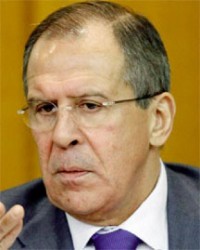PARIS/KIEV, (Reuters) – High-level diplomatic efforts to resolve the crisis in Ukraine made little apparent headway at talks in Paris yesterday, with Moscow and Washington at odds and Russia’s foreign minister refusing to recognise his Ukrainian counterpart.
U.S. Secretary of State John Kerry said discussions would continue in the coming days in an attempt to stabilise the crisis and he expected to meet Russian Foreign Minister Sergei Lavrov again in Rome today.
“Don’t assume that we did not have serious conversations which produced creative and appropriate ideas on how to resolve this. We have a number of ideas on the table,” he said after talks with ministers from Ukraine, Russia, Britain and France.
“I don’t think any of us had an anticipation that we were coming here at this moment, in this atmosphere of heightened tension and confrontation, that we were suddenly going to resolve that here, this afternoon,” Kerry said.

Russia had earlier rebuffed Western demands that its forces that have seized control of Ukraine’s Crimea region should return to their bases.
NATO, at a meeting in Brussels, announced it was cutting back on cooperation with Russia to try to pressure it into backing down on Ukraine and suspended planning for a joint mission linked to Syrian chemical weapons. The alliance said it would step up engagement with Ukraine’s new leadership.
The European Union offered Ukraine’s new pro-Western government 11 billion euros ($15 billion) in financial aid in the next couple of years provided Kiev reaches a deal with the International Monetary Fund. Germany, the EU’s biggest economy, also promised bilateral financial help.
Ukraine’s new finance minister, Oleksander Shlapak, caused a fall in the Ukrainian bond and currency markets by saying his economically shattered country may start talks with creditors on restructuring its foreign currency debt.
COLD WAR
Russia and the West are locked in the most serious battle since the end of the Cold War for influence in Ukraine, a former Soviet republic with historic ties to Moscow that is a major commodities exporter and strategic link between East and West.
Ukraine pulled out of a trade deal with the EU under Russian pressure last year, sparking months of protests in Kiev and the Feb. 22 ouster of Yanukovich, a Russian ally.
Ukraine says Russia has occupied Crimea, where the Russian Black Sea fleet is based, provoking an international outcry and sharp falls in financial markets on Monday, though they have since stabilised.
Lavrov said discussions on Ukraine would continue, but he did not talk to Ukrainian Foreign Minister Andriy Deshchitsya, whose new government is regarded as illegitimate by Moscow.
As he left the Foreign Ministry in Paris, Lavrov was asked if he had met his Ukrainian counterpart. “Who is that?” the Russian minister asked.
Deshchitsya said he believed a “positive outcome” would emerge. Asked why he had not met Lavrov, he shrugged his shoulders and raised his eyebrows.
French Foreign Minister Laurent Fabius said the situation was not easy.
“We are happy that this meeting in Paris allowed us get things under way. We agreed to try to find a peaceful solution in the coming days to get out of this crisis … something moved in the right direction.”
REPORTS DENIED
A senior U.S. State Department official denied Russian reports that Moscow and the Western powers had agreed the Ukrainian government and opposition should stick to a European Union-brokered peace deal.
“There were no agreements in this meeting, and there never will be without direct Ukrainian government involvement and absolute buy-in,” the official said.





